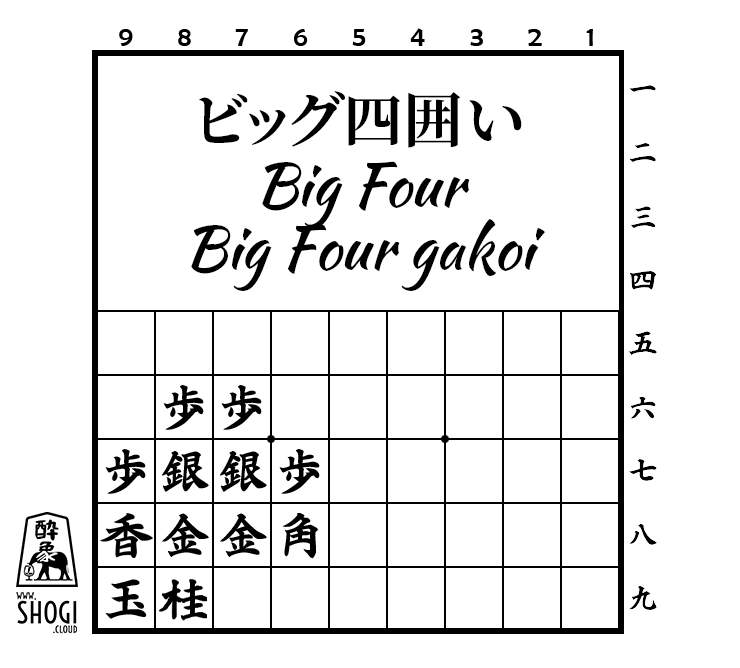italiano
Big Four gakoi
Kanji
ビッグ四囲い
Hiragana
ビッグよんがこい
Romaji
biggu yon gakoi
Significato
Quattro Grandi
Uso
ibisha
Pro
–
Contro
–
Note
Big Four è il più solido tra i kakoi. Eccellente resistenza frontale e laterale. Non è esente da debolezze. Il kakoi richiede moltissime mosse per essere terminato e si deve costruire attorno al Gyokusho dopo la sua collocazione finale. Tutti i generali partecipano alla difesa quindi non contribuiscono alla fase offensiva demandata a Hisha, Kakugyo e pezzi meno manovrabili. La concentrazione dei generali permette all’avversario di coordinare, con calma e più pezzi, la propria fase offensiva.
english
Big Four castle
Kanji
ビッグ四囲い
Hiragana
ビッグよんがこい
Romaji
biggu yon gakoi
Meaning
Big Four
Usage
static rook
Pros
–
Cons
–
Notes
Big Four is the most solid among the castles. It offers excellent frontal and lateral resistance. However, it is not without weaknesses. This castle requires a significant number of moves to complete, and it must be built around the King after its final placement. All the generals are involved in defense, so they do not contribute to the offensive phase, which is left to the Rook, Bishop, and less maneuverable pieces. The concentration of generals allows the opponent to coordinate their offensive phase calmly and with more pieces.
日本語
ビッグ四囲い
漢字
ビッグ四囲い
平仮名
ビッグよんがこい
ローマ字
biggu yon gakoi
意味
ビッグ四囲い
使い方
居飛車
利点
–
欠点
–
備考
ビッグ四囲いは角居の中でも最も頑丈です。優れた前面および側面への耐性を提供しますが、無弱点ではありません。この角居には多くの手数が必要で、最終配置後に玉将を中心に構築する必要があります。すべての歩兵は防御に参加し、したがって攻撃フェーズに貢献せず、飛車、角行、および操作性の低い駒に委ねられています。歩兵の集中は相手が冷静により多くの駒と協調して攻撃フェーズを調整することを可能にします。

